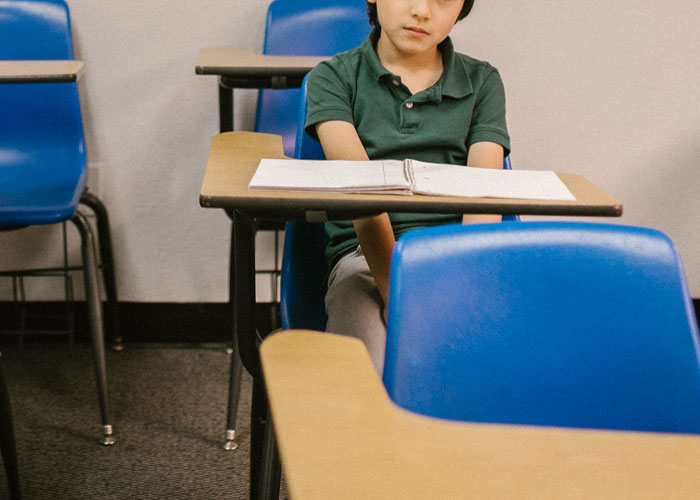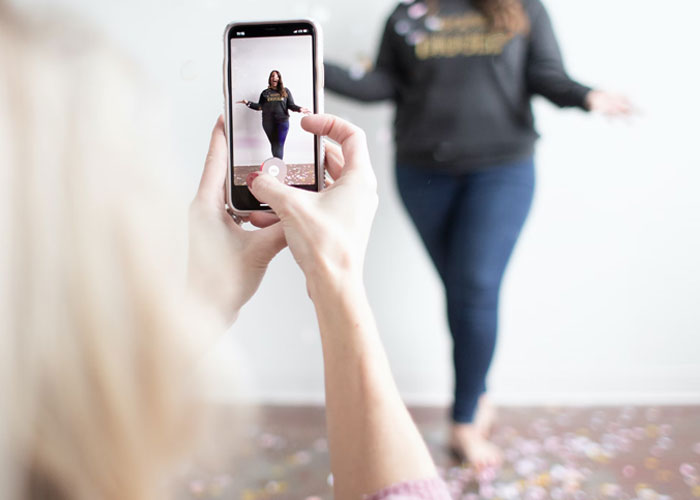Whether you were a geek or a rebel back in high school, whether you pulled all-nighters studying or partying back in your uni days, the chances are you still remember them like it happened yesterday. You may remember your first teacher and your favorite professor, and let me tell you, they remember you just as well.
But with so much experience of teaching generations after generations of kids and youngsters, they see something we cannot. And that’s how much students have changed with time, and how they differ from their predecessors years ago.
Someone asked an illuminating question “Teachers of Reddit, what changes have you noticed over time in the kids you teach?” which has shed light on some of the most interesting and surprising differences we haven’t thought about before.
Scroll down below to find out what they had to say and make sure to share our previous article with more teachers sharing differences between students then and now.
#1
I’ve been a teacher for 25 years now – in middle school that entire time. In the last few years, the changes have become really noticeable – really since COVID. Students no longer want to try to learn. They want the answers to be given to them for memorization only. Completely risk averse. Last year the lack of social skills was shocking too – things I would expect in preschool that 7th graders were doing (cutting other people’s hair, knocking over water bottles on purpose, damaging clothing or other personal items, etc.)
I really think the attention span is nil as well. Constant input, little to no creativity, attention span of only a few minutes. Not wanting to think – I had kids asking me how to answer multiple choice questions because you can’t draw lines on the answer sheet.
BUT – I also have kids that are more accepting of differences. Racism has decreased so much. We have girls on the football (American) team and boys in cheer. Kids will come up and talk to me about how Joe broke up with his boyfriend Steve and not be wigged out about it. Kindness is actually more than norm than it was 25 years ago and ‘gay’ is no longer a slur. I’ve worked with two teachers who were married that were both female and my vice principal was openly gay. Kids had no issues with that! We still have some mean kids, but a larger percentage are kind and the mean ones are not as popular as they once were.

Image source: mel2mdl, Yaroslav Shuraev
#2
Geek and nerd culture is growing popular.

Image source: piglalopa, Ashlynn2432
#3
Ok, I’ll be the contrarian here. I’ve been teaching high school for 22 years now – and I DON’T see the declining behavior or attention-span trends that other people complain about. Obviously teens are now pretty glued to their electronic devices, but I haven’t seen any meaningful big-picture changes in their intellects, processing capacity, or attention span.
Most of this thread seems to me like kvetching. Old people complain about the degeneracy of young people – it’s what humans do, and this thread seems destined to become a b***h-fest. There’s a pretty relevant quote from Roman times (Horace, circa ~20 BCE): “Our sires’ age was worse than our grandsires’. We, their sons, are more worthless than they; so in our turn we shall give the world a progeny yet more corrupt.”
What I HAVE seen that’s very heartening is increased tolerance. Teens used to throw around “gay” as a generic slur to disparage anything they didn’t like. A heavy homework assignment was “gay”. The cafeteria food was “gay”. And I used to see a lot more casual racism. My current students, who are mostly fairly privileged, are a lot more tolerant and less inclined to disparage groups that don’t resemble them.

Image source: WidmanstattenPattern, courtney coles
#4
Gonna go against the grain here. I’ve work with 5-11year olds for about 15 years. I find they are kinder, more creative and less bratty than they were when I first started. I haven’t heard a child use “gay” as an insult in years. In fact my students seem to be collectively against bulling.

Image source: loritree, Max Fischer
#5
Kids not so much. Parents are the ones who changed the most. Used to be if a kid was struggling you’d talk to the parents about and the parents would listen to your suggestions. Now if a kid struggles the parents blame you for failing and assume you’re a clueless moron.

Image source: Radthereptile, RODNAE Productions
#6
I’m a school counselor at a middle school. Over the last 5 or so years I’ve noticed that kids know way too much about mental health and incorrectly apply it to themselves. So many of them are diagnosing themselves with anxiety and/or depression when what they might be feeling is within the “normal” realm. Don’t get me wrong – I am seeing an increase in anxiety / depression – but kids are diagnosing themselves all the time including disorders like bipolar disorder, borderline personality disorder, etc. It’s almost like it’s now “cool” to have anxiety, depression or to cut. I’ve also seen kids use the words “gaslight” and “abuse” VERY lightly and it’s starting to lose the meaning of the word.

Image source: Itslocked_nd09, Polina Zimmerman
#7
Less sexism, racism and queerphobia. Kids are more open and willing to advocate for their mental health too.
Students are open to discuss enthusiastic consent and pull each other up on it – really they call each other out too on poor behaviour however they are quick to forgive.
They are pretty good are telling teachers about things impacting them or their personal life.
With beauty bloggers and tiktok they smell so much better then a decade ago. I’m glad tiktok is making them shower and wash their clothes with more frequency.
Covid has impacted their resilience however.

Image source: paperconservation101, Jana Sabeth
#8
I hate to be the optimist, but I have noticed the last few years students have started acting far less entitled and are far more self-starting and motivated. It’s almost a rejection of the years before them, where students seemed to be getting lazier and more demanding.
With this, however, and adding in the break from schooling they had during the pandemic, comes their questioning the need for school at a deeper level. They have become more adept at learning on their own and no longer respect the institution at all, and with good reason.

Image source: SLagonia, Thomas Park
#9
I teach middle school in Europe and aside from the reduced attention span thing being very evident, the other thing I’ve noticed is that kids are a lot more pessimistic these days: there is so much access to what’s going on in the world (which can obviously be good) but you can tell when kids have been reading too much bad news. As an example, each year I do an exercise where the kids predict what they think will be invented in the next 100 years. They used to predict things like flying cars, space travel, cancer cures etc. Now they predict nuclear weapons, guns and biological warfare…and they’re ELEVEN.
Also, fewer kids have hobbies. It used to be that every kid had at least one hobby to share during first day introductions. Now about 3/4 of kids say they don’t have any/don’t know/does tiktok count?

Image source: clickclickdomino, Ivonne Lecou
#10
This is my 13th year teaching as a college art instructor. For me there have been lots of changes, but far and away the biggest is a huge decline in creativity, work ethic, and sense of exploration.
There used to be a culture of “studio rats” that would be excited about trying whatever technique they recently learned and would spend countless hours in the studios making all sorts of things. Now? If someone is on the studio, you can bet they are glued to their phone.
The big moment that really made me realize the times were different was I had a student watch me working on a piece and blurted out “I could never do that.” I reassured them they could, I did it! You just have to start somewhere and gradually build up experience and learn techniques. (Etc). Nope. They were convinced they were totally incapable of making something. Heartbreaking really. They just seem so quick to give up, so quick as to never start. They allegedly WANT to be artists, and several have dreams of working for Apple or Pixar, but refuse to make anything. I try as I can to encourage them, but they seem pretty content to just coast into apathy while waiting for Pixar to knock on their door.
Also, I have noticed that socially they are much different as well. I used to have to reign in my classes several times a session as they were excessively talkative. Now, I’m prying conversations out of them, asking questions about current events while they are working on their projects.

Image source: AllThatsFitToFlam, cottonbro
#11
I’ve taught middle school technology/video journalism for the last 13 years. Kids have gotten way less creative in terms of shooting and editing video. The TikTok/youtuber generation of the last 5+ years has led to more “point and shoot” filming with little else. No creativity in terms of shot composition, writing a script, trying cool editing techniques. Just lazy and uninspired efforts and little drive to learn anything new or try anything that steps outside of their comfort zones. This goes to other artistic/coding projects too we do in Tech, not just videography.

Image source: Riot55, Ron Lach
#12
Over 20 years in public school teaching here. I’ve noticed kids want instant gratification/rewards. When I began teaching students worked to progress in a subject. Now (I suspect internet is to blame) they see a virtuoso play an instrument on Tik Tok, etc so they pick up a trumpet and expect to be Louis Armstrong. I constantly tell my students “it takes years of work and thousands of hours to achieve at that level. “ Same goes with sports. Little Johnny or Susie is 12 years old and extremely out of shape for their age, but they are the next Tom Brady or Serena Williams.

Image source: Maccamaniac33
#13
More recently, some students are really angry politically over things that previous students never saw politically. So, I teach an article about rhetoric used during the Holocaust against Jewish people to discuss language use and the rhetorical triangle. No complaints and students seemed to like it until about 2016. Then, suddenly, I started getting comments sneering about how people “want to feel oppressed” and “feel sorry for themselves” and how I’m a “brainwasher lib” for teaching it in my evaluations. It’s definitely the minority of students, but the language is all very I got this from certain circles on the internet talking points.
I also teach many of Thomas Jefferson’s writings in another class. Never an issue before recently when some students started complaining about his writings about slaves being included because apparently that is me “bashing founding fathers of America” and “attacking American values” even though it is literally words he published and stood by and I teach a lot of his writing, of which the slavery parts are pretty minimal. Maybe 3-4 pages of 40 pages we read from him. It’s just wild that teaching American historical documents from founding fathers in an Early American history class is now me “attacking America.”
Image source: Iownamovingcastle
#14
The biggest difference for me is just that my 2020 students are just nicer. They have a great deal of empathy and care for others. My seniors like to hang out with the freshmen and be cool. My girls are all nice to each other instead of being bitchy. My boys are open about their emotions and talk about their feelings freely.
And it isn’t just the school I work in. Some of my friends have siblings in that age group that are at different schools and I see the same thing in them.
I don’t know what sparked the change. My 2010 kids were pretty standard “high school sucks and I hate everyone” kind of kids. Which I totally get, I was probably the same way. But my current students are just so kind it’s hard to believe.

Image source: SalemScout, RODNAE Productions
#15
I’ve been a teacher for 27 years and teach students from 12 to 18. I’ve noticed that they’re becoming less mature with time. Seventh graders are more childish, 10th graders are now what 9th graders were about 20 years ago and so on. Kids are less independent and rely more on adults to help them (for example, when looking up information that matters to them). I also notice that they live more in the present. A lot of them don’t know what public holidays there are, and are often surprised when we tell them that school will be out on a certain day. (When I was a student we were well aware of all public holidays and when school would be out.) Finally, since smartphones have become a thing and everyone has one, they have become quieter but less attentive. Instead of talking to each other in class, a lot of them are trying to be on their phone. If you left them alone in class 15 years ago, even older kids would be really noisy. Now they will be mostly quiet and on their phones.
This is what I can think of off the top of my head! By the way, I’m in Europe.

Image source: Blisolda, RODNAE Productions
#16
Daycare/preschool teacher.
Kids are not being challenged enough. The gentle parenting trend, while a great idea, normally leads to permissive parenting. In other words, not telling your child “no”. God forbid I tell a child they can’t bite another child. Full blown meltdown. Which isn’t the worst part. I’m used to 3 year olds having meltdowns. It’s when the parents complain to my director about it.
We’re also seeing very easy to hit milestones falling behind. Look I think most milestones are b******t anyway, a kid will get it eventually. The issue becomes when our 4s room has to install a changing table because most of the kids are still in diapers.

#17
I do community circles with my class and we always end with a fun question. Recently it was “most embarrassing celebrity crush?” and the kids were totally fine naming celebrities of the same gender as them and other kids didn’t react to it at all in a negative way. The only comments were like “yeah, he IS cute” or “I totally forgot about her!” I WAS FLOORED and felt about 100 years old for being so taken aback by basic human decency.
Image source: WithIntention85
#18
Just started my 34th year. An inability to handle failure. Many will have complete meltdowns if someone doesn’t immediately swoop in to “save” them.
They’ve been so sheltered by helicoptering, bulldozing, and snowplowing, they don’t realize it’s okay to fail and learn from mistakes.

Image source: PicklePucker, Andrea Piacquadio
#19
I’ve taught middle school for around ten years, all of them in title 1 schools. I’ve noticed much more generalized social anxiety post covid. Students simply don’t socialize with people who are not in their friend groups. I’ve always had “shy” students in class, but a much higher number of students do not socialize with others as a general rule now.
There are not as many fights among students as there used to be. However, since the fights that do happen are recorded by several kids with devices, it seems to the students that there has been more fighting.
People are way more tolerant of differences in others in the classroom, but bullying stiill happens. This being the case, the number of students who stick up for their friends against bullies or unfair teachers is also on the rise.

Image source: rasputinmcgillicuddy, RODNAE Productions
#20
At least among middle – upper class, children are way too friendly with their parents. I don’t know what happened to rebelliousness, but I tutor and they get into college and their parents stay for a week helping them decorate their dorm, take them out to dinner, attend their sports games every weekend, and are always on the phone together.
When I went to college, I was dropped off, got a hug, we were all happy to reconnect at thanksgiving or Xmas.
Image source: ThinkIGotHacked
#21
They don’t curb their language at all around adults.

Image source: ChrisNEPhilly, cottonbro
#22
I teach second grade. I always have at least one kid who wants to be excused to do a TikTok in the hallway.

Image source: RifleShower
#23
Less able to follow written instructions. I suspect it’s because now most of the “how-to” stuff they encounter is in video format rather than books.
Poorer mental health.
Less development of personal talents. They just don’t do things for fun anymore aside from video games and social media. There is less of them developing into unique people as they all consume the same media diet and do the same things.
Less partying and all of the issues associated with it.

Image source: toodlesandpoodles, Karolina Grabowska
#24
Students are not really interested in getting good grades anymore. They even don’t want to be average. It is okay to be below average because you pass with a D (or a 4 in Germany). So why work harder?

Image source: wirfmalweg, Yan Krukov
#25
I’ve been teaching for 13yrs and the biggest thing that I’ve noticed is that students have much less stamina to research and support their claims. If it’s not coming up in the first five Google hits, the answer doesn’t exist and the info they do find is “correct” because it’s on the internet.

Image source: battlelevel, energepic.com
#26
When I was a kid, the most exciting day in school was when the teacher wheeled in the big tv on the cart. I teach second grade now, and there is no excitement for movie day. Also, when the students want to call home, I have them use the classroom phone (landline phone with cord). None of the kids know how to hang it up. They are only familiar with cell phones and touch screens.
Image source: Correct-Rooster-5039
#27
I’ve been an elementary music teacher for 25 years. Over the years, I’ve noticed that children have less and less ability to regulate their emotions: more tantrums, more destructive rage, more crying when challenged.
We used to send disruptive kids to the office. Now when a child goes on a destructive rampage, we evacuate the rest of the class while he/she destroys the classroom. And the rest of the kids generally take it in stride.

Image source: sommerfugl, Danya Gutan
#28
Attention spans have reduced over time.
Even the most effective teachers notice how easily distracted students become – as if their minds naturally drift toward thoughts related to social media rather than staying focused on learning.

Image source: Back2Bach, Andy Barbour
#29
Welcome to the results of the 1990’s self esteem movement. Kids were given awards for mere participation, and no experience in losing. Losing will always be a part of life, and kids today can’t seem to deal.
Image source: Gromit801
#30
Somehow young kids humor in like 2017 or so all the sudden started necessitating like five layers of irony.
Most trends in slang or memes are based around the idea of sounding stupid until it becomes normalized and no one thinks of it again. Yeet was like this, dabbing is sorta like this. “Vibing” is in that transitional phase where it’s starting to be normalized. Heck replacing various swear words.
Anything before like 2015 was so simple, you could actually relate to the kids. What happened lol?
Image source: SliideToTheLeft
 Follow Us
Follow Us





